
-
 TikTok's journey from fun app to US security concern
TikTok's journey from fun app to US security concern
-
The video games bedeviling Elon Musk

-
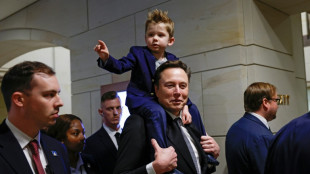 Gamers tear into Musk for 'faking' video game prowess
Gamers tear into Musk for 'faking' video game prowess
-
Global equities rally, pushing London and Frankfurt to new records

-
 US grounds SpaceX's Starship after fiery mid-air explosion
US grounds SpaceX's Starship after fiery mid-air explosion
-
US to tighten trade rules to hit low-cost China shipments

-
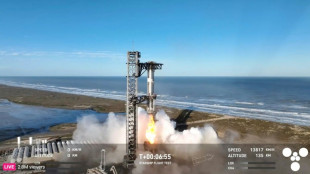 US grounds SpaceX's Starship rocket pending probe
US grounds SpaceX's Starship rocket pending probe
-
IMF raises global growth outlook and flags rising economic divergence

-
 London, Frankfurt hit record highs as global equities rally
London, Frankfurt hit record highs as global equities rally
-
Pompeii reveals 'impressive' bath complex

-
 EU deepens probe into X after Musk outbursts
EU deepens probe into X after Musk outbursts
-
London stock market hits record high as global equities rally

-
 2024 saw fastest-ever annual rise in CO2 levels: UK weather service
2024 saw fastest-ever annual rise in CO2 levels: UK weather service
-
'No money': gloom on Beijing streets as economic growth slows

-
 Nintendo shares tumble as Switch 2 teaser disappoints
Nintendo shares tumble as Switch 2 teaser disappoints
-
Apple sidelines AI news summaries due to errors

-
 China says population fell for third year in a row in 2024
China says population fell for third year in a row in 2024
-
Asian traders give mixed reaction as China's economic growth slows

-
 Chinese economic growth among slowest in decades
Chinese economic growth among slowest in decades
-
'Damaging' AI porn scandal at US school scars victims

-
 Nintendo shares tumble as Switch 2 preview disappoints
Nintendo shares tumble as Switch 2 preview disappoints
-
SpaceX catches Starship booster again, but upper stage explodes
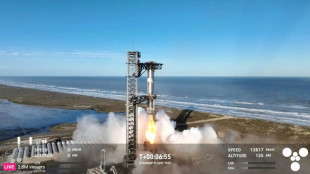
-
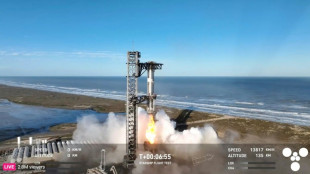 SpaceX catches Starship booster but upper stage explodes
SpaceX catches Starship booster but upper stage explodes
-
Hypertec Cloud Partners With Potentia to Power Sustainable AI Cloud Expansion With Additional 480MW of Balanced Capacity Across North America

-
 Insurance access for US homeowners with higher climate risks declines
Insurance access for US homeowners with higher climate risks declines
-
Wall Street rally loses steam as European luxury shares advance

-
 China set to post sluggish growth as doldrums deepen
China set to post sluggish growth as doldrums deepen
-
US braces for freezing weather fueled by polar vortex

-
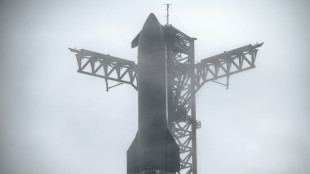 Musk's Starship set for launch after Bezos orbital triumph
Musk's Starship set for launch after Bezos orbital triumph
-
Surf star Slater pays tribute as Quiksilver co-founder Green dies

-
 Teen kills fellow student teacher at Slovak school
Teen kills fellow student teacher at Slovak school
-
LIV Golf sign United States broadcast deal with Fox Sports

-
 Slovak entrepreneur funding rescue of German flying taxi startup
Slovak entrepreneur funding rescue of German flying taxi startup
-
French researchers aim to ease X refugees' path with 'HelloQuitX'

-
 China property giant Vanke's CEO 'taken away' by police: report
China property giant Vanke's CEO 'taken away' by police: report
-
Oil giant BP cuts thousands of jobs to slash costs

-
 EU announces 120 mn euros in Gaza aid after ceasefire
EU announces 120 mn euros in Gaza aid after ceasefire
-
Nepal's top court bars infrastructure in protected areas

-
 Stock markets jump as inflation worries ease
Stock markets jump as inflation worries ease
-
China to probe US chips over dumping, subsidies

-
 India's outcast toilet cleaners keeping Hindu festival going
India's outcast toilet cleaners keeping Hindu festival going
-
Apple loses top spot in China smartphone sales to local rivals

-
 Sri Lanka signs landmark $3.7 bn deal with Chinese state oil giant
Sri Lanka signs landmark $3.7 bn deal with Chinese state oil giant
-
Blue Origin's New Glenn rocket blasts into orbit for first time

-
 UK economy rebounds but headwinds remain for govt
UK economy rebounds but headwinds remain for govt
-
Stocks follow Wall St higher on welcome US inflation data

-
 Blue Origin's New Glenn rocket blasts off in first launch, reaches orbit
Blue Origin's New Glenn rocket blasts off in first launch, reaches orbit
-
Chinese give guarded welcome to spending subsidies

-
 World Bank plans $20 bn payout for Pakistan over coming decade
World Bank plans $20 bn payout for Pakistan over coming decade
-
Indian Bollywood star Saif Ali Khan stabbed in burglary


Strike-hit Boeing leaves experts puzzled by strategy
A historic round of cost-cutting measures at Boeing has left experts perplexed and wondering whether the aviation giant, plagued by a month-long strike, is sacrificing its future.
"I'm not sure I see the bigger plan here," Richard Aboulafia, a consultant with AeroDynamic, told AFP.
"Getting rid of a lot of talent when there's a serious aerospace talent shortage doesn't seem like the smartest move," he added.
The company announced a series of belt-tightening measures and production delays on Friday, as the strike of 33,000 workers has added to Boeing's litany of problems.
Boeing staff with the International Association of Machinists (IAM) and Aerospace Workers walked off the job on September 13 after overwhelmingly rejecting a contract offer.
Boeing plans to reduce its workforce by around 10 percent over the next few months. It employed almost 171,000 people by the end of 2023, including 41,000 outside the United States.
"There may be some fat, but the idea that there's 10 percent fat, I can't imagine in what universe that could be true," said Aboulafia.
According to analysts at TD Cowen, the group is carrying out a "strategic reset" to raise capital and fill its coffers by as much as $10 billion, in the absence of aircraft deliveries.
Boeing has been struggling after the crashes of 2018 and 2019 (346 deaths in total) and the Covid-19 pandemic. The company's cash position is rapidly diminishing as the strike continues.
Despite negotiations that began in May and intensified since mid-September, the disagreement between the IAM machinists' union and Boeing persists, with relations appearing to be at an all-time low.
Boeing withdrew its latest offer after a third round of government-mediated talks last week and filed an accusation of unfair labor practice with the federal labor agency (NLRB), matching a similar move by the union in September.
- Need cash -
According to Melius Research, a fundraising effort would "strengthen Boeing's negotiating position," as it would remove the urgency of finding an agreement to restart production.
The direct financial impact of the first month of the strike reached $5 billion, including $3.26 billion for Boeing, according to Anderson Economic Group.
The remainder included losses on industry wages, suppliers, Boeing customers and the Seattle area beyond those directly hit by the strike.
Another option for recovering fresh cash is to sell off non-strategic assets, noted TD Cowen, which identified some $20 billion dollars in potential value.
Emirates airline boss Tim Clark told specialist website The Air Current, "Unless the company is able to raise funds... I see an imminent investment downgrade with a Chapter 11 (bankruptcy proceeding) looming on the horizon."
Negotiations are stalling over pay raises - Boeing has gone from a 25 percent increase to 30 percent over four years, while the union is demanding 40 percent.
The union also wants the reinstatement of a pension scheme that was abolished in 2008, which is a nonstarter for Boeing.
- Siege mentality -
Melius Research suggested that the strike is not really a surprise, as it is "a symptom of a bigger problem."
Workers feel they have made many sacrifices for Boeing over the past 20 years.
Meanwhile, between 2010 and 2019, the group paid out $68 billion to shareholders in dividends and share buybacks.
Boeing also announced $5 billion in pre-tax charges in the third quarter -- to be published on October 23 -- partly due to the strike, as well as the halt in production of the 767 Freighter.
The union insisted that "Machinists did not cause" the job cuts or the halt to the 767 program, stating that the walkout was "a direct outcome of poor decision-making by Boeing's executives."
For its part, Boeing said: "We really want to reach an agreement that offers our employees better pay and market-leading benefits," accusing the IAM of making "misleading" statements.
Both sides are "preparing for a siege," said consultant Aboulafia.
Y.Jeong--CPN
